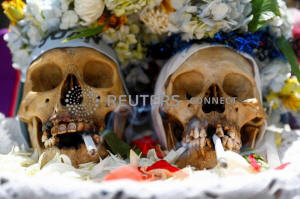|
In
La Paz on Friday, Bolivians celebrated the Day of Skulls, known
as "ñatitas," which are decorated and paraded to the cemetery a
week after All Saints Day. Some skulls are adorned with hats,
flowers, sunglasses and even cigarettes.
The ñatitas spend most of the year indoors. The tradition is
believed to have its roots in the Urus Chipaya custom of
disinterring the bodies of loved ones at the one-year
anniversary of their death.
"They (skulls) told me they are worried, not only the Ñatitas,
but all the saints in heaven and that they see us and they think
Bolivia will get back to normal again," said Delfina
Condotiticona, a regular devotee of the practice.
"We hope that President Evo Morales has wisdom and also believes
in Pachamama (Mother Earth) and in all the saints. I think this
situation will get better; they told me very soon, the solution
is on the way and Bolivia will resume its path."
The country has been locked in a standoff since contentious
elections last month, which were won by leftist leader Morales,
who has been in power since 2006. However, the vote was marred
by a halt to the count and widespread allegations of fraud.
Bolivian opposition leader Carlos Mesa called for new elections
on Friday, though Morales has repeatedly defended his win and
rejected calls to step down.
"We always light candles and we see the candles are crying
because they are also worried about the situation that Bolivia
is going through," said Sheyla Aguilar.
Traditions and cultures of the Aymara, Quechua and other groups
remain strong in Bolivia, where indigenous people are a majority
in a country set in the heart of South America.
Jose Wanca, another devotee, added that the skulls had shown him
a vision about stopping the ongoing violence between pro- and
anti-government supporters, who have clashed repeatedly on the
streets, with three confirmed deaths since the Oct. 20 vote.
"I had a dream, and they told me we need to fix up Bolivia right
away," he said. "They told me that we're fighting between
brothers and that is a shame."
(Reporting by Adam Jourdan; editing by Jonathan Oatis)
[© 2019 Thomson Reuters. All rights
reserved.] Copyright 2019 Reuters. All rights reserved. This material may not be published,
broadcast, rewritten or redistributed.
Thompson Reuters is solely responsible for this content.

|
|






